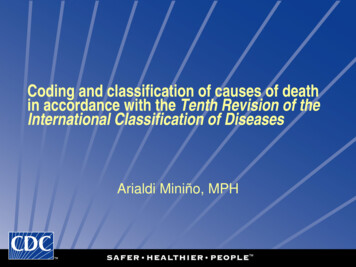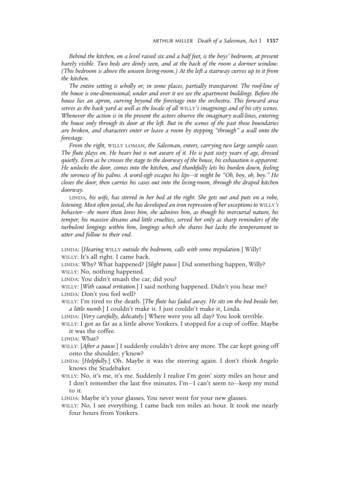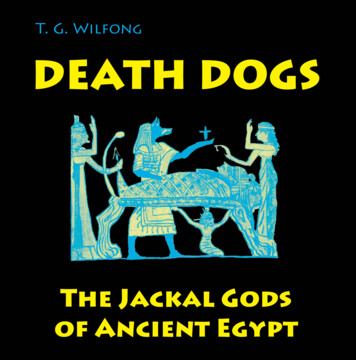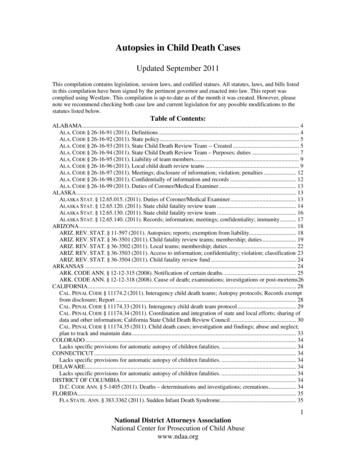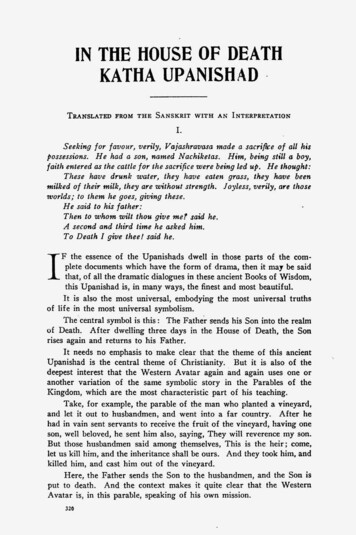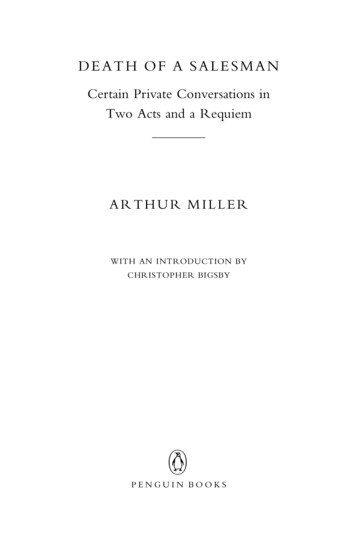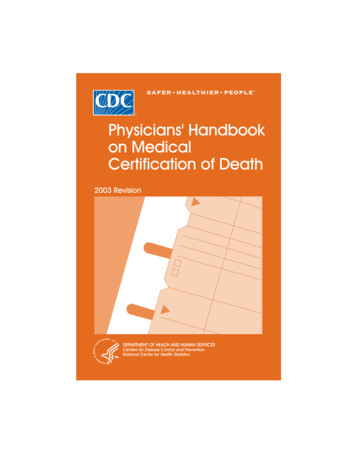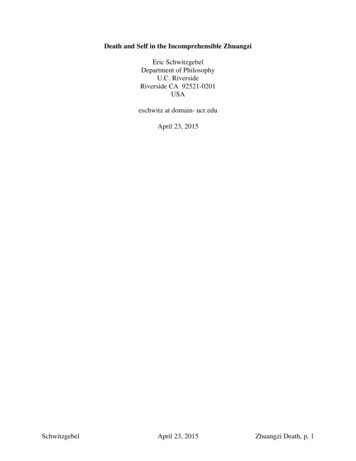
Transcription
Death and Self in the Incomprehensible ZhuangziEric SchwitzgebelDepartment of PhilosophyU.C. RiversideRiverside CA 92521-0201USAeschwitz at domain- ucr.eduApril 23, 2015SchwitzgebelApril 23, 2015Zhuangzi Death, p. 1
Death and Self in the Incomprehensible ZhuangziThe ancient Chinese philosopher Zhuangzi defies interpretation. This is an inextricable part ofthe beauty and power of his work. The text – by which I mean the “Inner Chapters” of the texttraditionally attributed to him, the authentic core of the book – is incomprehensible as a whole.It consists of shards, in a distinctive voice – a voice distinctive enough that its absence is plain inmost or all of the “Outer” and “Miscellaneous” Chapters, and which I will treat as the voice of asingle author. Despite repeating imagery, ideas, style, and tone, these shards cannot be piecedtogether into a self-consistent philosophy. This lack of self-consistency is a positive feature ofZhuangzi. It is part of what makes him the great and unusual philosopher he is, defyingreduction and summary.i.We don’t know exactly when in the compilation of the text the Inner Chapters took their presentorder, but the opening passage of the text as we now have it is a striking introduction.There is a fish in the Northern Oblivion named Minnow, and Minnow is quitehuge, spanning who know how many thousands of miles. He transforms into abird named Breeze, and Breeze has quite a back on him, stretching who knowshow many thousands of miles .The Tales of Qi, a record of many wonders, reports: “When Breezejourneys to the Southern Oblivion, the waters ripple for three thousand miles.Spiraling aloft, he ascends ninety thousand miles and continues his journey forhalf a year.”SchwitzgebelApril 23, 2015Zhuangzi Death, p. 2
– It’s a galloping heat-haze! – It’s a swirl of dust! – It’s some livingcreature blown aloft on a breath of air! And the blue on blue of the sky – is thatthe sky’s true color? Or is it just the vast distance, going on and on without end,that looks that way? When Breeze looks down, he too sees only this and nothingmore (p. 3-4).1Let’s suppose it’s an important part of the text’s design that it starts this way. An odd start forbook of philosophy!For one thing, it’s false. Of course, there’s no such fish that turns into a giant bird, norwas there ever (probably) a text called the The Tales of Qi that Zhuangzi supposedly drew thisstory from. It’s absurd!It’s also a parable. A bit further along, the passage continues:The cicada and the fledgling dove laugh at him, saying, “We scurry up into theair, leaping from the elm to the sandalwood tree, and when we don’t quite make itwe just plummet to the ground. What’s all this about ascending ninety thousandmiles and heading south?” A small consciousness cannot keep up with a vast consciousness; shortduration cannot keep up with long duration. How do we know? The morningmushroom knows nothing of the noontide; the winter cicada knows nothing of thespring and autumn. This is what is meant by short duration. In southern Chuthere is a tree called Dark Genius, for which five hundred years is a single springand another five hundred years is a single autumn. In ancient times, there was1Here and throughout I use the Ziporyn translation (Zhuangzi 4th c. BCE/2009), modifiedby following Kjellberg’s (Zhuangzi 4th c. BCE/2005) literal translations of non-historicalcharacters’ names, except where specified. Here, I have replaced Ziporyn’s translation of thetext’s name as Equalizing Jokebook with Kjellberg’s more neutral Tales of Qi.SchwitzgebelApril 23, 2015Zhuangzi Death, p. 3
even one massive tree whose spring and autumn were each eight thousand yearslong. And yet nowadays, Pengzu [reputed to have lived eight hundred years]alone has a special reputation for longevity and everyone tries to match him.Pathetic, isn’t it? (p. 4).As I read it, this passage serves at least the following three functions.First function: It signals that what Zhuangzi says is not to be taken at face value.Zhuangzi emphatically does not do philosophy in the way Mozi, Aristotle, or Kant doesphilosophy, by laying out a series of statements presented as truth. In fact, throughout the textZhuangzi uses a wide variety of devices to dislodge the typical reader’s general assumption thatphilosophical texts are in the business of stating truths. He makes seeming assertions, then raisesobjections or questions about those assertions, then fails to resolve those questions. Much of thetext is in quotation from people whose wisdom we might wonder about: a butcher, a speakingtree, a “madman”, a convicted criminal with an amputated foot, a hunchbacked woman,miscellaneous dubious sages with funny names, and especially “Confucius” who says a mix ofthings, some of which Zhuangzi would presumably reject and some seemingly closer to whatZhuangzi might accept. Zhuangzi uses humor, parody, paradox, absurdity. He explicitlycontradicts himself. He seems to say almost nothing with an entirely straight face. The giantflying minnow-bird is only the start of this.Second function: The principal import of the parable seems to be this: Small thingscannot comprehend large things; and just as short-lived insect cannot understand the change ofseasons, we human beings should not be able to understand things vastly larger than ourselves.And the world does contain things vastly larger than ourselves, even if not exactly the onesZhuangzi mentions. Now it’s crucial to understanding the bearing of this parable on theSchwitzgebelApril 23, 2015Zhuangzi Death, p. 4
remainder of the text to know whether Zhuangzi includes himself among the small beings withlimited understanding. You might read him otherwise. You might read him as setting himselfup as a sage whose wisdom is beyond ordinary human understanding. You might read him assaying: Reader, you are like the cicada and this book is like the giant bird. You will notunderstand it, at least not in your first, second, or third read, but that is because you are small andlimited and have not yet achieved my level of wisdom. I do think philosophers often try tointimidate readers into thinking that if there is something they don’t understand or something thatseems mistaken, the readers themselves must be the ones at fault, rather than the philosopherwhose text it is. This is an authoritarian and cowardly practice. I don’t think this is whatZhuangzi is doing. Rather, I propose, Zhuangzi regards himself too as one of the cicadas.If so, this would explain the first feature of the text that I pointed out: his constant selfundermining. Zhuangzi does not want the reader to take his words as authoritative. Theopposite. Presumably, he wants the reader to find some philosophical value in reading the text,but he works constantly against the human tendency, when we are reading philosophy we enjoy,to accept the text we enjoy as truth. The text is too full of explicit self-doubt, too absurd, tooself-contradictory, for it to be truth. It is literally, as whole, incomprehensible – asincomprehensible as the world itself, at least to little doves like us. If I am right, there is not,beneath the text, a single coherent message that could have been said plainly, if only Zhuangzihad wished to do so. I will develop this point more, in connection with Zhuangzi’s passagesabout death and self. For now, just consider this: Zhuangzi is presumably either presentinghimself as a limited animal baffled by the greatness of things or as someone of greatunderstanding by whom we of lesser understanding will be baffled. There are at least tentativereasons to favor the former view.SchwitzgebelApril 23, 2015Zhuangzi Death, p. 5
Third function: The passage introduces two themes that recur throughout the text, inaddition to the recurring theme of limited human knowledge: self and death. In the first twosentences of the text, a giant minnow transforms into a giant bird. This only the first crossspecies transformation in the text, and it raises the question of what, if anything, remainsconstant in such transformations, whether we ourselves could undergo radical transformationswhile continuing to exist. Thus, the question of self, of what makes us the beings we are, isbroached, and a liberal attitude toward transformation is hinted at but not explicitly developed.On the topic of death, Zhuangzi seems to be doing at least two things. One is to admire the longlived, at least for their broad vision and possibly for their longevity itself. Another is tochallenge our own attitudes toward longevity: Viewed in a large enough perspective, even an800-year life is not that long, not really much different from what we would normally regard as abrief life.ii.Zhuangzi seems to think it’s a good thing to “live out your years” – whatever that means. Thisview is, I believe, a genuine strand in the text, though there are other strands that problematize it,and it’s not clear what it really amounts to. When I say that the text is “incomprehensible”, thisis the sort of issue I have in mind. I don’t mean that individual passages are incomprehensible,nor that all ways of reading Zhuangzi on death are equally good or bad. Let’s walk through thecase.Ziporyn translates the title of Chapter Three as “The Primacy of Nourishing Life” (p. 21).It begins with a passage that seems to recommend us “to maintain our bodies, to keep the life inSchwitzgebelApril 23, 2015Zhuangzi Death, p. 6
them intact, to nourish our parents, and to fully live out our years” (p. 22).2 It continues with astory about a butcher so skilled that after nineteen years of cutting oxen his knife is still sharp asif straight from the whetstone, on which a king comments, “Wonderful! From hearing thecook’s words I have learned how to nourish life!” (p. 23). Zhuangzi appears to advocate that you“live out all your natural years without being cut down halfway” (p. 39). Zhuangzi celebratestrees that are big and useless and are thus never chopped down (p. 8, 30-31). Zhuangzi seems toprefer the yak who cannot catch mice over the weasel who can and who thus, hurrying about,dies in a snare (p. 8). In the voice of “Confucius”, Zhuangzi seems to think it bad if a disciple iskilled by a tyrant (p. 25; similarly, p. 29-30). The Inner Chapters conclude with the story of anemperor who lacks the seven holes in his head that the rest of us have, and who dies when hiswell-meaning friends drill him holes – a story presumably sad (though also funny) and in whichpresumably the emperor’s death implies that something has gone wrong (p. 54). In light of thesepassages and others, it seems reasonable to suppose that Zhuangzi, or at least one strand ofZhuangzi, shares with most of us the rather un-radical view that living out one’s full life-span isa good thing, and preferable to dying young.Yet, though “the sage” likes growing old, the sage equally likes dying young (p. 43).And Zhuangzi’s Confucius, confronted with two men evidently more wise than he, who havebeen singing a goofy, joyous song to a friend’s corpse, says that “Men such as these look uponlife as a dangling wart or swollen pimple, and on death as its dropping off, its bursting anddraining” (p. 46-47). Zhuangzi also says:2Replacing Ziporyn’s “those near and dear to us” with the less English and moreConfucian “parents”, following Watson (Chuang Tzu, 4th c. BCE/ 1968, p. 50) and Graham(Chuang-tzu, 4th c. BCE/1981, p. 62).SchwitzgebelApril 23, 2015Zhuangzi Death, p. 7
The Genuine Human Beings of old understood nothing about delighting in beingalive or hating death. They emerged without delight, submerged again withoutresistance. Swooping in they came and swooping out they went, that and no more(p. 40).Royal Relativity, who seems to speak for Zhuangzi, says that “even death and life can do nothingto change” (Kjellberg: “make no difference to”; Watson: “have no effect on”; Graham: “alternothing in”) the “Consummate Person” (p. 18).3On the face of it, it seems like Zhuangzi is saying, in some places, or at least assuming,that we should prefer living out our years to being cut down early; while in other places he seemsto be portraying sages and other sorts of superior people as not preferring long life over death.How might we reconcile these apparently conflicting strands in the text? I will review somepossibilities drawn from the recent Anglophone literature on Zhuangzi.One possibility is suggested by A.C. Graham: Phrases like “nourishing life” and “livingout one’s years” are familiar from the Yangist school of philosophical thinking in ancient China(best represented in selected “Yangist” chapters identified by Knoblock and Riegel in theirtranslation of The Annals of Lü Buwei, 3rd c. BCE/2000). According to the Yangists, one’sprimary aim should be to nurture the body and preserve life, especially one’s own body and life.The Yangist-seeming strands and phrases in the text might reflect a residue of Zhuangzi’sthinking earlier in his career, possibly reflecting Yangist schooling, before he matured intoequanimity.43The original Chinese phrase that I have presented the four translations of here is死生無變於己.4See Graham’s commentary from p. 116-118 Chuang-tzu (4th c. BCE/1981). Graham isnot clearly committed to seeing the Inner Chapters in this way: In his 1989 (p. 202) he seems toSchwitzgebelApril 23, 2015Zhuangzi Death, p. 8
Another possibility is suggested by Robert E. Allinson (1989): Different strands in thetext might speak to readers at different levels of understanding. Passages about nurturing lifemight be directed toward readers of lower understanding, for whom nurturing life would be astep forward; passages about sages’ indifference to death might be directed toward readers at amore advanced stage.Nothing in the texts, I think, compels us to reject either of those approaches. However,neither matches my own sense of the text. One consideration against Graham’s view is that boththe preferring-life passages and the not-preferring-life passages are scattered through the wholeof the “Inner Chapters”. There would have to be quite a lot of temporal mangling of the text forfor the strands to reflect different stages in Zhuangzi’s development. One consideration againstAllinson’s view is that it seems to give us a Zhuangzi who sees himself as so superior to thereader that he is ready to dispense pablum advice to that segment of his readership who would dowell to advance even partway toward his own level of understanding. This is not the selfdoubting, anti-authoritarian Zhuangzi I see in the text, who treats the reader as an equal.Another possible interpretation is this: Skillful action requires equanimity, includingequanimity in the face of risks to one’s life. Skillful responsiveness to nature can help one liveout one’s years rather than being cut down early. Semi-paradoxically, then, if one hopes forlongevity, one ought not care too much about it. Perhaps something like this fits withinterpretations of Zhuangzi that emphasize the importance, for him, of skillful, spontaneousresponsiveness without critical linguistic judgment (Graham 1989; Hansen 1992; Ivanhoe 1993;Carr and Ivanhoe 2000).want to reconcile the Yangist phrasings with the mature Zhuangzi, more in accord with the skillinterpretation which I offer below.SchwitzgebelApril 23, 2015Zhuangzi Death, p. 9
There are two main difficulties with this interpretation as a means of resolving theapparent tension in Zhuangzi’s remarks about death. One difficulty, which I don’t think hasbeen sufficiently recognized in the secondary literature that is currently most influential inAnglophone philosophy, is that many of the most important skill passages in the Zhuangzi areoutside of the Inner Chapters, and thus of dubious authenticity. The Inner Chapters themselvescontain one clear celebration of skillfulness, the butcher’s skill in carving oxen, offered as ameans of “nourishing life” (p. 22-23), but elsewhere skillfulness is not marked for praise: theweasel’s skill in catching rats leads to its death (p. 8), Huizi’s logical skill ends in obscuritiesabout “hard” and “white” (p. 15) and maybe harms his life (p. 38), and games of skill are said tolead to competitive strife (p. 28); simultaneously, Zhuangzi praises useless, unskilled trees andyaks, and also people with disabilities that limit their skill at traditionally valued tasks.The other main difficulty is that if equanimity about death is subsidiary to some greateraim of preserving life, then Zhuangzi’s sages and Consummate People have strangely lost trackof their priorities, for it seems that they no longer care about this greater aim. Perhaps they livelonger as a result, but it is only by having forgotten what really, on this interpretation, has value.It is actually we, with our more conventional valuing of life over death, who better know theproper value of things.Still another resolution emphasizes the following passage:The Great Clump burdens me with a physical form, labors me with life, eases mewith old age, rests me with death. So it is precisely because I consider my lifegood that I consider my death good (p. 43).This sounds like an argument. A first pass thought might be this: Life is impossible withoutdeath. So if I value life I must therefore also value death. But if this is the argument, it is a poorSchwitzgebelApril 23, 2015Zhuangzi Death, p. 10
one. Perhaps life as we know it is impossible without death at some point, as a resolution.Nonetheless, a long, healthy life of eighty years is perfectly conceivable as a valuable life; andnothing about the necessity of death prevents one from strongly preferring that type of life over ashort life of twenty years. But if we take at face value the passages about the sage liking dyingyoung, the sage does not appear to have that preference, which is exactly the mystery and thetension with the other passages I’ve highlighted. Another possible reading of this argumentemphasizes that physical form is a “burden”, life is a “labor”, old age is “ease”, and death is away of “resting”. This sounds a bit like the pessimistic view that life is an unpleasant hassle thatone is well rid of; but that doesn’t fit so well with the upbeat and joyful attitude that Zhuangziseems to favor elsewhere.The passage continues, ending with a remark that I had briefly paraphrased above:You may hide a boat in a ravine or a net in a swamp, thinking it is secure there.But in the middle of the night, a mighty one comes along and carries it away onhis back, unbeknownst to you in your slumber. When the smaller is hidden withinthe larger, there remains someplace into which it can escape. But if you hide theworld in the world, so there is nowhere for anything to escape to, this is anarrangement, the vastest arrangement, that can sustain all things.This human form is merely a circumstance that has been met with, justsomething stumbled into, but those who have become humans take delight in itnonetheless. Now the human form in its time undergoes ten thousandtransformations, never stopping for an instant – so the joys must be beyondcalculation! Hence, the sage uses it to roam in that from which nothing everSchwitzgebelApril 23, 2015Zhuangzi Death, p. 11
escapes, where all things are maintained. Early death, old age, the beginning, theend – this allows him to see each of them as good (p. 43).With this passage in mind, Chris Fraser (2013) suggests that Zhuangzi is embracing an “aestheticattitude” that celebrates the constant stream of transformations that is the Dao, the way of things– the stream of transformations that gives you life and then, soon or not quite as soon, gives youdeath.5 Similarly, Roger Ames (1998) sees Zhuangzi as inviting us to reconceptualize life as“life-and-death”, a series of transformations, in a “ceaseless adventure” (1998, p. 66).Despite the merit of these interpretations, especially as approaches to this particularpassage, they do seem to strain against the substantial thread in Zhuangzi that seems to favornurturing life and living out one’s natural span of years rather than being chopped down early. Ifevery transformation is as good as every other, why not see the chopping as just another excitingtransformation? Why not celebrate the weasel’s being caught in the snare, the tree’s beingshaped into boards by an energetic carpenter and becoming someone’s house?Still another possibility here might be drawn from Amy Olberding’s (2007) reading ofpassages from the Outer and Miscellaneous Chapters describing Zhuangzi’s reaction to the deathof his wife and his friend Huizi. (Also see Wong 2006.) Whereas Graham sees the differentstrands in Zhuangzi as reflecting different phases in his philosophical career and Allinson seesthem as speaking to different target audiences, Olberding suggests that Zhuangzi’s attitude mightvary during the process of personal mourning for loved ones. Olberding suggests that Zhuangzireacts to death by recognizing its disvalue, but only briefly, before shifting to a recognition of5In earlier work, Fraser (2011) suggests something like the equanimity-for-skillfulresponding interpretation discussed above. In that work, he allows that that this interpretationintroduces a “fundamental tension” between different parts of the text. If Fraser is willing toread the long-life-is-better aspects and the neither-is-preferable aspects as logically incompatibleand on a par, so that neither subordinates or subsumes the other, then that would put his viewclose to the one I am defending in this essay.SchwitzgebelApril 23, 2015Zhuangzi Death, p. 12
death as part of what gives life its value and interest, in a series of transformations that is overallto be celebrated.Olberding thus appears to attribute conflicting attitudes to Zhuangzi – interpreting him asembracing one attitude in some moments (that death is bad, his feeling in moments of immediatepersonal grief) and another attitude in other moments (that death is not bad but anothertransformation to be celebrated, his feeling as he distances himself from personal grieving). Ifso, this puts her view close to my own: I think Zhuangzi sincerely expresses both of theseconflicting opinions about death.But there are, I think, at least two more dimensions of complexity to this picture. First,we have not yet seriously confronted the strangeness of the metaphysical view that Zhuangziseems to be embracing in this last passage and in some others – that human form is simply acircumstance that you are temporarily met with. More on this in the final section of this essay.And second, there are Zhuangzi’s skeptical remarks about death, to which I now turn.iii.Zhuangzi sometimes expresses radically skeptical views – especially but not exclusively inChapter 2, “Equalizing Assessments of Things”. When Toothless asks Royal Relativity, whoseems to speak for Zhuangzi, “Do you know what all things agree in considering right?” RoyalRelativity replies “How could I know that?” When Toothless then asks if he knows that hedoesn’t know, Royal Relativity again replies, “How could I know that?” (p. 17). In the voice ofMaster Long Desk Zhuangzi asks:SchwitzgebelApril 23, 2015Zhuangzi Death, p. 13
Suppose you and I get into a debate. If you win and I lose, does that really meanyou are right and I am wrong? If I win and you lose, does that really mean I’mright and you’re wrong? Must one of us be right and the other wrong? Or couldboth of us be right, or both of us wrong? If neither you nor I can know, a thirdperson would be even more benighted (p. 19).In both of these passages, the seeming assertion of skepticism is tempered both by placing it inanother’s mouth – someone it’s natural to regard as speaking for Zhuangzi, but who might not –and also by posing skeptical doubts as questions rather than positively asserting the truth ofskepticism. However, in a way this makes the passages even more skeptical: Like RoyalRelativity, Zhuangzi here seems unwilling to assert anything, not even that he lacks knowledge.In previous work (Schwitzgebel 1996), I have argued that such passages should be taken at facevalue as expressions of radical skepticism, rather than tempered or tamed or qualified, despite thefact that this renders the text as a whole inconsistent. And since the text as a whole isinconsistent, Zhuangzi’s aim in presenting these radically skeptical passages might be somethingother than to persuade the reader to embrace radical skepticism as the final correct philosophicaltheory.Two other skeptical passages bring us directly into issues of death and self. The first is,again, in the voice of Master Long Desk.How, then, do I know that delighting in life is not a delusion? How do I knowthat in hating death I am not like an orphan who left home in youth and no longerknows the way back? Lady Li was a daughter of the border guard of Ai. Whenshe was first captured and brought to Qin, she wept until tears drenched her collar.But when she got to the palace, sharing the king’s luxurious bed and feasting onSchwitzgebelApril 23, 2015Zhuangzi Death, p. 14
the finest meats, she regretted her tears. How do I know the dead don’t regret theway they used to cling to life? Perhaps a great awakening would reveal all of this to be a vast dream (p.19).The second passage is perhaps the most famous passage in the Zhuangzi:Once Zhuang Zhou dreamt he was a butterfly, fluttering about joyfully just as abutterfly would. He followed his whims exactly as he liked and knew nothingabout Zhuang Zhou. Suddenly he awoke, and there he was, the startled ZhuangZhou in the flesh. He did not know if Zhou had been dreaming he was a butterfly,or if a butterfly was now dreaming it was Zhou. Surely, Zhou and a butterflycount as two distinct identities! Such is what we call the transformation of onething into another (p. 21).The Lady Li passage starts with Master Long Desk seeming to admit that he hates death. Hethen raises doubts about the grounds of his hatred. It is possible, in fact I think natural, if onejettisons commitment to seeing Zhuangzi as entirely self-consistent across passages, to interpretthis as a confession on Zhuangzi’s part: Zhuangzi, too, hates death, wants to nourish life and liveout his years. He is not like the “Genuine Human Beings” he celebrates elsewhere in the text,who emerge without delight and submerge without resistance or the men who see life as aswollen pimple and death as draining it.In this passage, Zhuangzi does not say that he (or Master Long Desk) is wrong to havesuch an attitude. He only expresses the more skeptical thought that he might be wrong, that hemight be like Lady Li when first captured, that he might wake up and find his new situation to bea vast improvement over the current situation that he normally regards as waking life.SchwitzgebelApril 23, 2015Zhuangzi Death, p. 15
So I believe I hear not just two but three distinct voices in the text: one that takes forgranted that nourishing life and living out your years is preferable to being cut down early, onethat values life and death equally and sees nothing to regret in dying young, and one that hatesdeath but entertains doubts about the wisdom of that hatred. I am not proposing that these arethree different authors. There is a commonality of philosophical style among them, and all threevoices weave together throughout the text. I am proposing instead that Zhuangzi, like many ofus, is ambivalent, inconsistent, confused, cannot quite see how everything hangs together, andthe text reflects this in an open, self-revealing way. Zhuangzi is not offering us a unified visionof the True Theory of Things and the One Right Way to Live. He is sharing his wonder andbafflement.iv.Let’s take Zhuangzi at his word in the butterfly passage: He thinks it at least possible that he is abutterfly dreaming that he is a human. Bracketing Kripkean (1980) worries about metaphysicalvs. epistemic modality, this passage suggests that Zhuangzi does not regard himself asnecessarily human or essentially human. This of course fits with Zhuangzi’s remark, quotedearlier, that “human form is merely a circumstance that has been met with” (p. 43). Anotherrelated passage is in the voice of Master Arrive:Now, suppose a great master smith were casting metal. If the metal jumped upand said, “I insist on being nothing but an Excalibur!” the smith would surelyconsider it to be an inauspicious chunk of metal. Now, if I, having happened tostumble into a human form, should insist, “Only a human! Only a human!” thenSchwitzgebelApril 23, 2015Zhuangzi Death, p. 16
the maker of changes would certainly consider me an inauspicious chunk ofperson. So now I look upon all heaven and earth as a great furnace, and themaker of changes as a great blacksmith – where could I go that would not be allright? All at once I fall asleep. With a start I awaken (p. 46).6Master Arrive is portrayed as saying these words as he is at the very edge of his own death.Shortly before, his friend Master Plow has already commented similarly, “Do not disturb histransformation!. What will it make you become; where will it send you? Will it make you intoa mouse’s liver? Or perhaps an insect’s arm?” (p. 45).These passages envision radical changes in physical form while the self or the “I” (orsomething like that) continues to exist: “I” might wake and find myself a human, which I was notbefore, and then “I” might wake again and find myself something else, such as a bug’s arm.Taking the passages at face value, Zhuangzi seems to be envisioning a re-awakening ofconsciousness after these changes. The Lady Li passage suggests there might even be memoryof one’s previous form, regret for the way I previously clung to life.We have a choice, I think, between treating these passages as what P.J. Ivanhoe calls“heroic metaphysics” (2010) and treating them as what I will call real possibilities. If we readZhuangzi as a heroic metaphysician, then we read him as committed to a m
even one massive tree whose spring and autumn were each eight thousand years long. And yet nowadays, Pengzu [reputed to have lived eight hundred years] alone has a special reputation for longevity and everyone tries to match him. Pathetic, isn’t it? (p. 4). As I read it, th
